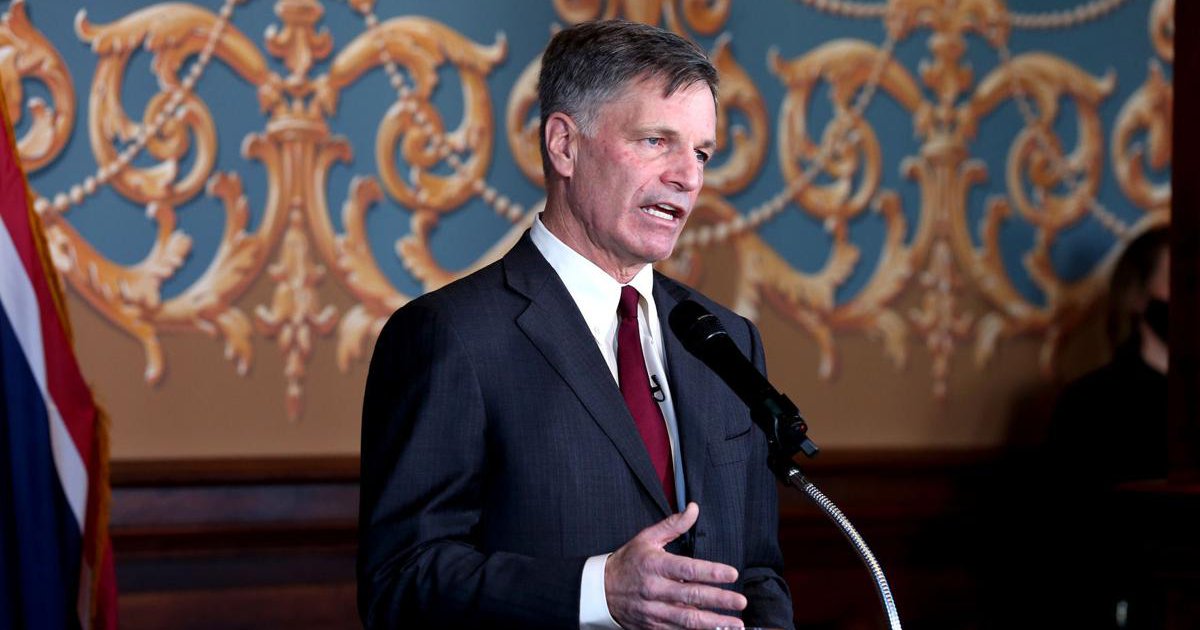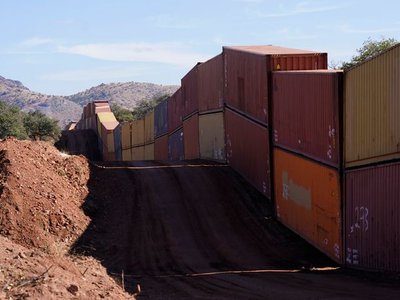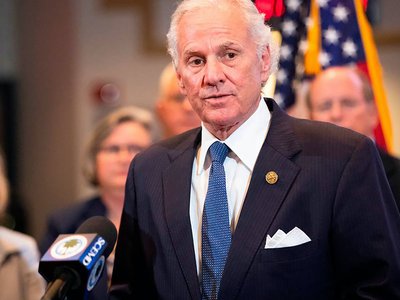CHEYENNE — Gov. Mark Gordon delivered his State of the State address Tuesday morning to an in-person Legislature, emphasizing the need to confront the state’s daunting budget shortfall in education funding. He also underlined the need to persevere through the pandemic recovery and defend the state’s fossil fuel industries.
He delivered the address from the historic Supreme Court chambers at Wyoming’s recently renovated Capitol.
The speech came later than usual this year due to the COVID-19 pandemic. In January, the governor addressed Wyoming’s 66th Legislature during the first day of its general session. But a full State of the State speech was delayed until Tuesday, the second day of a monthlong in-person session.
During his State of the State address Tuesday, Gordon concentrated on the strengths of Wyoming and the ability for its residents to endure adversity. He cited the state’s falling unemployment rate and “extraordinary efforts” by teachers and health care workers to keep the state running. But he also noted the significant toll of the past year, and asked for a moment of silence to acknowledge the 671 Wyomingites who have lost their lives to the virus.
“Better days lie ahead, but we must never forget those who have passed,” Gordon remarked.
He also admitted severe budget cuts exacted last summer had already left an indelible mark on the state’s families and communities.
“Like a pandemic can’t be ignored, conditions in 2020 require that we make significant cuts to the budget that the 65th Legislature passed just a year ago,” he said. “These were the largest cuts in our state’s history, prompted by the largest loss of income in our state’s history. Many of these cuts devastated state government services and programs, including ones that serve some of our most vulnerable people.”
In response to the economic downturn caused primarily by the pandemic, Gordon instituted a series of searing budget cuts last year. The governor has proposed a supplemental budget, which includes $515 million in reductions for consideration this month. In March 2019, the Legislature approved a $3.3 billion budget for the state.
What Gordon has been unable to touch is public education funding, which is constitutionally protected. Lawmakers continue to mull ways to find new revenue streams or cut back on services.
The meat of the governor’s address circled around the Legislature’s task of solving the state’s “broken” K-12 public education funding model.
“The biggest elephant in the Capitol this year is the future of Wyoming’s K-12 education system,” he said.
Record-low oil prices and depressed demand for coal have robbed the state of expected revenue. But the structural decline began several years before the pandemic landed in Wyoming, as thermal coal has gradually been replaced by cheaper natural gas and renewable energy sources. The brunt of the revenue shortfall will likely be felt in the state’s robust public education system, which has reaped the primary benefits of fossil fuel production.
“We must ensure that the next generation of Wyoming students will graduate with the tools necessary to succeed in this modern economy,” Gordon said. “And that is a moral obligation. How we get there, and how we afford it is a question that’s now before us. We’ve relied for years on funding model that is no longer sustainable, the handwriting on the wall that can we kicked down the road every year. It’s broken.”
He emphasized the need to simplify and pare the budget.
“I believe Wyoming citizens should be able to easily understand how public school funds are spent to better comprehend the state’s true financial condition,” he said. “They deserve no less, because it’s their money.”
On energy, Gordon implored the Legislature to “pick up where we left off last year” and push forward legislation to save the state’s struggling coal industry, by propping up carbon capture and other new technologies. He called on lawmakers to support bills to help eliminate carbon dioxide, a climate warming pollutant, specifically from Wyoming’s fossil fuel activities.
Carbon capture is the process of trapping, reusing or storing carbon dioxide. But the technology has yet to be fully commercialized. He also pointed to the need to maintain healthy agricultural practices and forests to keep carbon emissions low.
“I want to make sure you know Wyoming is embracing solar and wind development,” Gordon said. “Both are emerging and important parts of Wyoming’s total energy portfolio ... Wyoming can and must be a leader in carbon capture and other emerging technologies, even as we pursue the development of resources such as wind or solar.”
But he also reiterated the need to keep both traditional fossil fuel sources and renewable energy open as options for the future.
“We have to take the lead and not look back,” Gordon added, criticizing a recent order implemented by the Biden administration to pause the issuing of new leases for oil and natural gas development on federal lands. “That’s the best and the only way to meet the threats we face.”
“I will not waver in my efforts to protect our industries, particularly our coal industry,” he added. Wyoming is the nation’s leading producer of coal.
Gordon did not limit his remarks to just to Wyoming’s economic outlook.
Early on in his speech, Gordon acknowledged Wyoming’s two tribal nations and called for continued focus on missing and murdered Indigenous women.
“I want to recognize our friends citizens and sovereign neighbors, the Northern Arapaho and Eastern Shoshone tribes,” he said.
The state recently released a report, conducted by the Wyoming Survey and Analysis Center at the University of Wyoming, on missing and murdered Indigenous people.
“This report, the first in the nation, provides local data and perspectives directly from Indigenous families impacted by violence,” Gordon said. “It provides evidence of what tribal leadership has known, that Native American Wyomingites are subjected to higher rates of violence.”






